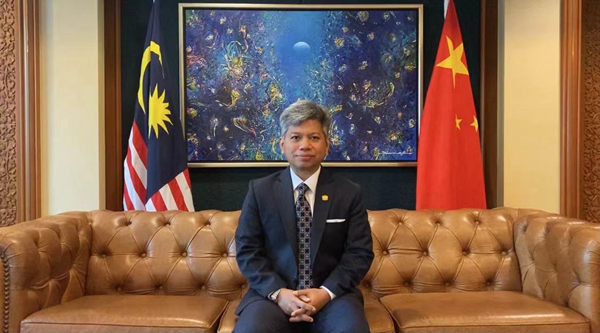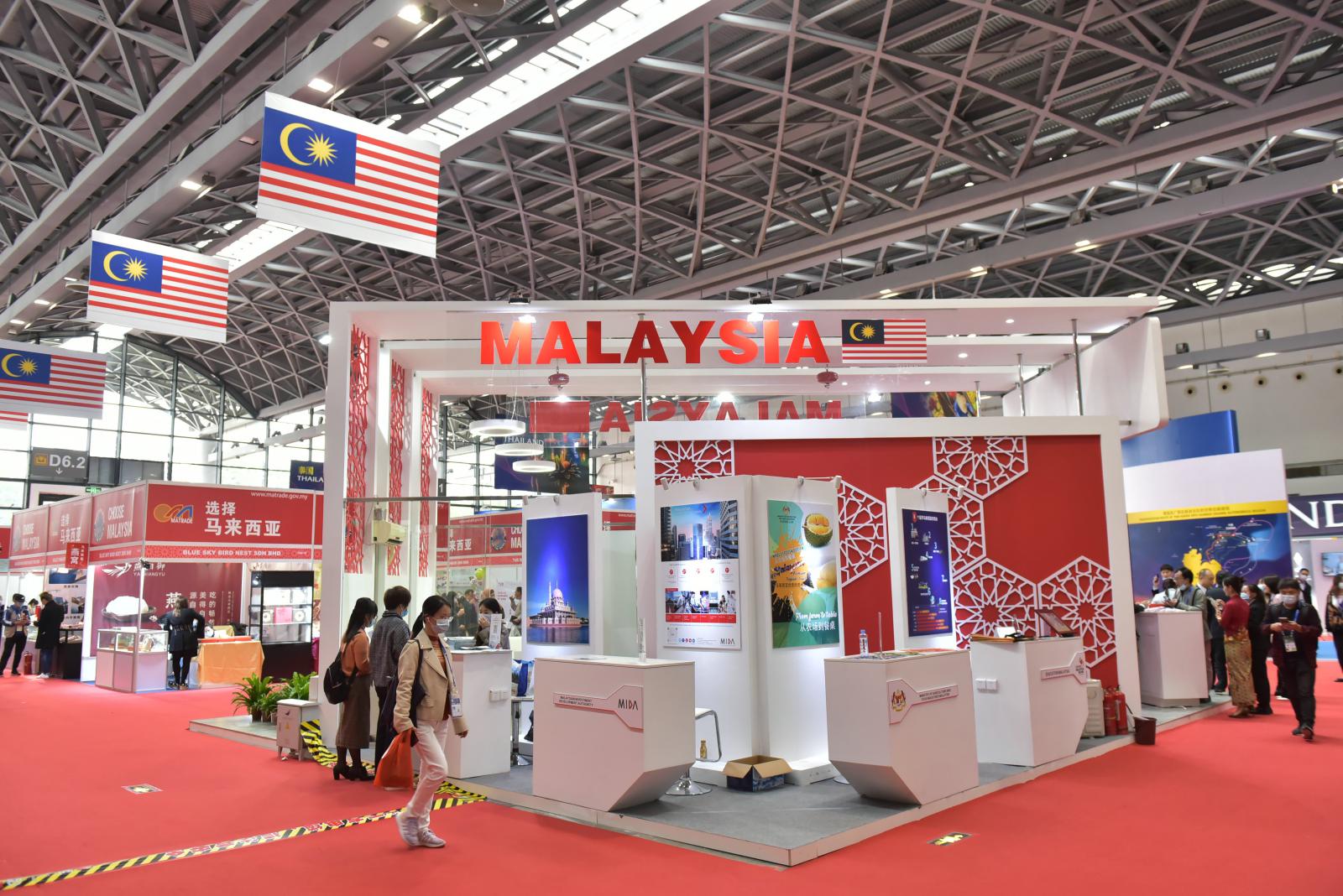

Written by Huang Yunyun / Translated by Chen Zhiying
Malaysia is one of the founding members of ASEAN. Thirty years ago, Qian Qichen, the then Chinese State Councilor and Foreign Minister, was invited to the opening ceremony of the 24th ASEAN Foreign Ministers’ Meeting in Kuala Lumpur, Malaysia for the first time. It marked the beginning of China-ASEAN dialogue relations.
On the 30th anniversary of China-ASEAN dialogue relations, reporters of China-ASEAN Panorama Magazine interviewed H.E. Mr. Raja Dato’ Nushirwan Zainal Abidin, Ambassador of Malaysia to China. In his opinion, Malaysia has benefited a lot from China-ASEAN dialogue relations. Bilateral relations will continue to develop in the future.
“China is always a major country that is too big to ignore”
At the beginning of the interview, Mr. Ambassador told us about the necessity of strengthening ties between ASEAN and China. “China and Malaysia established diplomatic relations in 1974. Malaysia is the first ASEAN country to establish diplomatic relations with China. This is because China is a major country that is too big to ignore at any time and will not be left out of the mainstream international politics and economy. Therefore, ASEAN has always hoped to strengthen exchanges with China, which is actually to strengthen communication between ASEAN and the world,” said Mr. Ambassador.
Since 1991, when the then Malaysian Prime Minister Mahathir invited China to attend the ASEAN Foreign Ministers’ Meeting, Malaysia has been active in its relations with China.
Mr. Ambassador believes that Malaysia has gained a lot from the dialogue relations. “The first is peace and stability in the region, which is very important.” He pointed out that the development of this dialogue relations has also driven the development of bilateral relations between ASEAN countries and China. “In my opinion, China is the most active dialogue partner of ASEAN.” He said that one of the manifestations is that China actively cooperates with ASEAN countries to fight against the pandemic. For example, at the beginning of the outbreak, Wang Yi, Chinese State Councilor and Foreign Minister attended the world’s first foreign ministers’ meeting on the fight against the pandemic, namely the the Special ASEAN-China Foreign Ministers’ Meeting on Coronavirus Disease (COVID-19).
Mr. Ambassador said that the Malaysian Embassy in China currently takes promoting the anti-pandemic work as a priority, and the exchange on relevant experience with China is vital in China-Malaysia anti-pandemic cooperation. In his opinion, “science” and “cooperation” are two key factors in China’s achievements in combating the pandemic. Malaysia is trying to learn from these experiences and hopes to reproduce China’s achievements. In addition, the Embassy also played an active role in vaccine cooperation between the two countries. Regarding China’s vaccine aid, Mr. Ambassador said: “I would like to express my gratitude to the Chinese government and people.”
The Embassy also serves as a bridge in promoting China-Malaysia economic and trade cooperation. Although the pandemic has hindered bilateral cooperation in some fields, Mr. Ambassador said: “The two countries still need to maintain a good relationship. We should not only focus on the current pandemic, but also have to make plans for the post-pandemic era.”

“China-Malaysia economic and trade relations will be further developed”
Economic and trade cooperation plays an important role in China-ASEAN cooperation. It provides many internal driving forces for both sides to establish and maintain friendly and stable relations. The pandemic once raised people’s concern on China-Malaysia cooperation, but the growth, despite the pandemic, of bilateral trade volume and investment scale in 2020 showed great resilience and vitality of bilateral cooperation.
In the first half of 2021, the trade volume between China and Malaysia reached US$ 81.79 billion, a year-on-year increase of 43.9%. “This is a considerable figure and an almost counter-intuitive achievement,” said Mr. Ambassador. He also said that the COVID-19 pandemic reminds people to pay attention to the global supply chain. In the past, the international supply chain was widely linked to many industries and many countries, but the pandemic has made us realize that the anti-risk ability of a long supply chain may not be as strong as expected. “In the future, we hope to build a shorter and more regional supply chain. The signing and the entry into force of the Regional Comprehensive Economic Partnership agreement (RCEP) will accelerate this process.” said Mr. Ambassador. “Because of that, ASEAN-China relations, especially Malaysia-China economic and trade relations, will be further developed.”

What is the future growth point of China-Malaysia economic and trade cooperation?
Mr. Ambassador pointed out that about 35% of the US$ 131.16 billion trade volume between China and Malaysia in 2020 came from strategic component trade such as semiconductors and integrated circuits. In the future, such area will become a new focus of bilateral cooperation.
In addition, Mr. Ambassador believes that the innovative achievement of China-Malaysia industrial integration, namely the mode of “Two Countries, Twin Parks” between China and Malaysia, also has good prospects. He said that although the construction process of Malaysia’s East Coast Rail Link built by China has slowed down due to the pandemic, it can promote infrastructure connectivity and provide impetus for building Malaysia-China Kuantan Industrial Park. “In the future, the “Two Countries, Twin Parks” between Malaysia and China will welcome better development.” He said.
As an important platform for promoting the cooperation mode of “Two Countries, Twin Parks”, the China-ASEAN Expo (CAEXPO) has been held for 17 consecutive years. In 2020, Mr. Ambassador went to Nanning, Guangxi to participate in the CAEXPO. Now, he still has a vivid memory of different booths, products and friendly people. From this, he also saw the potential of an expanded China’s consumer market. “China’s market structure is very complex. Consumers have a keen eye and have certain requirements for taste and price. Malaysian enterprises must improve the competitiveness of their products and services.”
For the upcoming 18th CAEXPO, Mr. Ambassador put forward pragmatic expectations: “Buy products from Malaysia and ASEAN as a means of improving the relations.”

“China and Malaysia boast great prospects in people-to-people and cultural exchanges”
“Bilateral relations should not be limited to political exchanges, and economic and trade exchanges. People-to-people and cultural exchanges also serve as important links in bilateral relations,” said Mr. Ambassador. According to him, before the pandemic, Malaysia attracted 3 million Chinese tourists and 16,000 Chinese students to travel and study in Malaysia. In China, about 16 universities set up Malay majors, and this number has been increasing year by year. The TV series The Little Nyonya,which tells the story of Peranakans in Malacca, is also popular in China. “People-to-people exchanges have been very strong.” He commented.
However, under the pandemic, outbound tourism is inevitably impacted. In the future, how can both sides revitalize tourism and promote people-to-people and cultural exchanges? “We are working closely with China and hope to establish a green channel for personnel exchanges and realize mutual recognition of vaccine certificates, so as to promote people-to-people exchanges,” said Mr. Ambassador. He also said that at present, the vaccination rates in Malaysia and China have increased significantly. As of August 6, 2021, 65.6% of adults in Malaysia had received the first dose of vaccine and 35.3% had completed two doses of vaccine. As first, Malaysia was originally scheduled to achieve the goal of vaccinating 80% of its citizens by February 2022 and achieve mass immunization. But it has been advanced to October 2021. Mr. Ambassador believes that the increase in vaccination rate will be more conducive to promoting bilateral negotiation on easing restriction of personnel exchanges.
In terms of education, Mr. Ambassador has full confidence in Malaysia. “At present, Malaysia is one of the education hubs in the ASEAN region. Our tagline is ‘Truely Asia’ and ‘providing world-class education at an affordable price’.” Mr. Ambassador believes that more Chinese students would study in Malaysia with the pandemic under control. In Malaysia, a considerable number of college students choose to study in China. Mr. Ambassador hopes that these students can return to Chinese campuses as soon as possible to finish their studies.
China and Malaysia have forged a millennium friendship and are good partners in seeking common peace and development. No matter what new changes and challenges may face in the future, we believe that cooperation will be the mainstream of bilateral relations.
桂ICP备14000177号 Copyright@2006-2013 Guangxi China-ASEAN Panorama Magazine Agency Co., Ltd. All Rights Reserved